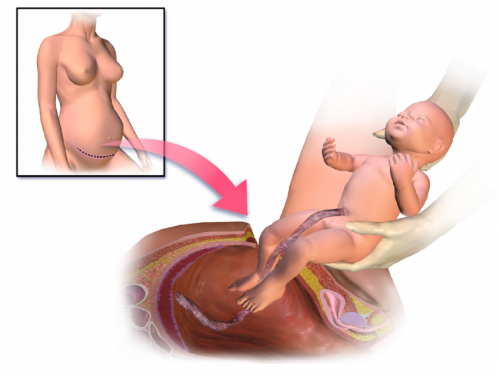Cesarean section may cause epigenetic changes

(Medical Xpress)—A new study from Karolinska Institutet indicates that the mode of delivery could make an imprint in the stem cells of the newborn infant. The finding may be of interest for understanding why individuals born by cesarean section statistically have an increased risk of immunological diseases. However, it is still unclear if this so-called epigenetic mechanism is temporary or remains over time.
Delivery by elective cesarean section is increasing drastically worldwide, and is today the most common surgical procedure in fertile women. Among those born by cesarean section, an increased risk of certain diseases, such as asthma, type 1-diabetes, obesity, and celiac disease, has been noticed. To date, the causes of this statistical association have not been clarified.
"The biological mechanisms predisposing a fetus or a newborn infant to get a certain disease later in life are complex and depend on both genetic and environmental factors during formative years", says Tomas Ekström, Professor of Molecular Cell Biology. "In this study, our focus has been whether the way a baby is born can have an impact on a cellular level in the form of epigenetic alterations in DNA."
Epigenetic changes in the DNA of the cell nucleus occur when environmental factors affects the way the genes are encoded without altering the actual genetic code. Thus, genes can be switched on and off to adapt body functions following the necessities of the surrounding environment. Today, we know that toxic substances or diet can cause epigenetic changes, which in some cases can even be passed on to the next generation.
In the current study, published in the American Journal of Obstetrics and Gynecology, researchers investigated epigenetic alterations in stem cells from sorted cord blood. Global epigenetic analysis was then done from 43 infants, of whom 18 were delivered by cesarean section. Finally, DNA from 12 infants (6 cesarean sections) was analyzed for genome-wide locus-specific epigenetic states. The result shows specific epigenetic differences between the groups in almost 350 DNA regions, including genes known to be involved in processes controlling metabolism and immune defense.
"During a vaginal delivery, the fetus is exposed to an increased level of stress, which in a positive way will prepare the unborn baby for life outside the uterus," says Mikael Norman, a pediatrician and Professor of Neonatology. "This activation of the fetus' defense systems doesn't occur when a cesarean section is performed before labor begins, which in turn could be a possible cause for the noticed differences between the groups.
With this new study, researchers hope to add important knowledge for the further understanding of how cesarean section may impact gene expression in blood stem cells and the function of the immune system in relation to health and disease later in life. However, they also point out that it is still unknown whether the differences that were found in the studied babies remains over a longer period of time, and thus actually have an impact on future disease risk. More research therefore needs to be conducted within this field.
More information: 'Cesarean section and hematopoietic stem cell epigenetics in the newborn infant - implications for future health?' Malin Almgren, Titus Schlinzig, David Gomez-Cabrero, Agneta Gunnar, Mikael Sundin, Stefan Johansson, Mikael Norman & Tomas J. Ekström. American Journal of Obstetrics and Gynecology online 1 July 2014, DOI: dx.doi.org/10.1016/j.ajog.2014.05.014














